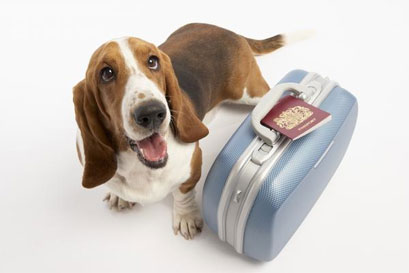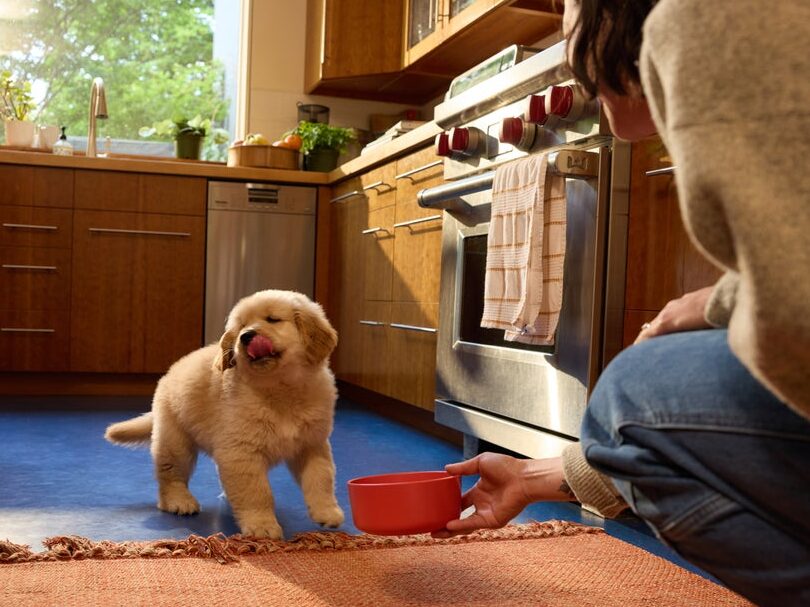Hey Ollie blog readers! We’re offering you an exclusive 60% OFF your starter box! Try now!
One of the most effective ways shelters and rescue operations handle overcrowding is through temporary foster care until a forever home can be found. A dog may stay with a foster short term (a few days or weeks) or even longer term (months to a year). This in-between fostering provides a literal grace period for dogs who might otherwise face euthanasia.
This isn’t the only reason that foster care benefits shelter pups. Spending time in foster care allows pups a place to rest and relax and get out of the noisy stressful shelter. Another great benefit is that foster parents really get to know these pups and can help be their voice and advocate. Remember Tinkerbell? This dramatic little pup found the perfect home thanks to the dedication and superior writing skills of her foster.
In a foster home, a dog can work through fears and work on their manners. Learning how to properly walk on a leash, go to the bathroom outside and interact with people and other dogs (or cats). This will give the dog a head start when transitioning to a forever family.
Finally, easy to spread diseases like kennel cough can run rampant through the shelter and being stressed and sick makes dogs less likely to get adopted and more likely to develop more severe diseases or complications. Having a clean and safe foster home prevents this from happening in the first place!

8 Signs you might be ready to foster
So, how do you know if fostering might be right for you? Here are 8 clues it might be time to give it a try!
- You are a homebody. If your favorite four-letter word is home and turning down last-minute invitations to a weekend getaway is easier for you than breathing, fostering might fit. Foster dogs are usually leaving the noise and stress of shelter life, so a calm, predictable environment is like a magic potion. (Plus, now you have an easy out. “Sorry, I’m fostering a dog. Can’t come.” You’re not a jerk, you’re a saint!)
- Your long-term forecast is unclear. Perhaps you have recently joined the CIA and your current position has you working from home for six months, but next year you may be wearing a series of disguises as you make your way through Siberia on assignment. You might enjoy the companionship of a dog in the short term without any long-term complications. While our example might be a little extreme, the reality of the situation is that bringing a dog into your home can be a 10-15 year commitment. Even if you were to adopt an older dog, you’re still looking at a long commitment and possibly some medical bills as age related conditions come into play. So if you want the companionship but not the commitment, fostering is an amazing option.
- You have special skills. Dogs placed in foster situations often need some type of extra care that a shelter is unable to provide. Whether it’s help with house-training, socialization, or recovery from a medical procedure, foster parents with a particular skill set are priceless. If you love the satisfaction of helping a dog reach a goal that will make him/her more adoptable, fostering might be right up your alley. Even if you don’t have these skills but you want to learn – some shelters or rescue groups may be able to help you learn how to better support your foster.
- You have another pet who enjoys occasional friends. If you have a dog that is very social but a two dog household would be too much full time, consider short term fostering. You will still have to make careful introductions since you’re bringing another dog onto your pup’s “turf”. But you and your pup may find that this is an enjoyable experience for everyone involved. You can also take note of the type of dogs your pup likes to have visit. Maybe they prefer a dog who is smaller than them or only enjoy the company of young puppies. This is something you’ll learn as you go.
- You want a dog, but can’t quite afford one yet. Most of the time, shelters will cover the cost of caring for the pet, everything from a collar to food to vet visits. Foster parents still end up spending some personal money on things like toys and the occasional matching human/pet t-shirts, but fostering is rarely a financial burden. (Looking at you, animal-loving grad students.)
- You know what you can handle…and what you can’t. If you’re interesting in fostering but need a very specific type of dog (like, a house-trained small dog, for instance), make it known loud and clear upfront with the agency.
- You believe in fostering as a cause. The fear most potential foster parents have is that they will fall in love and want to adopt every dog who comes through the door. THAT FEAR IS WELL-FOUNDED. Especially when the dog is a good fit with the rest of the household. If you’re able to focus on the fact that fostering allows you to save MANY dogs instead of only one, it’s easier to let that special one go. Signing a contract for your partner that you won’t adopt any more animals doesn’t hurt either. And remember, that pet is going to a forever home made possible by your generous foster care and that soothes the sting.
- You don’t mind being a little pushy.
Finding a forever home for your foster is your job too. Utilize your social network and social media to spread the word and help find the right home for your foster friend. Bonus: if you place the dog with one of your friends, you have guaranteed visitation rights!
When to adopt a dog of your own
Whether you’re an experienced foster or just ready to bring home a pup, adoption might be the right choice for you.
If you’re thinking about adopting a foster
Remember that if you bring the dog perminantly into your home, that is potentially one less spot available for future fosters. That said, sometimes you meet the perfect dog and fall in love.
You’re already ahead of the game because you and the pup have already had a chance to really get to know each other in a low pressure environment. The term "foster failure" was coined just for this situation and for the right dog and family pairing – its something shelters and rescues love to see!
If you’re generally considering adopting
Don’t be afraid to ask lots of questions and be firm about your non-negotiables. Like we talked about when deciding to foster if it’s important to you that the dog is a certain age, generally healthy or already house trained it’s okay to speak up.
Dogs who are not matched well risk being returned to the shelter. If you want a dog that is between 2 and 4 years old, under 50 pounds and is house trained and knows how to walk on a leash, don’t just go for the first dog you meet. Especially if that dog doesn’t meet most of your criteria.

Ready to take the next steps? Here’s what to do
If you’re ready to take the next step toward fostering or adopting a dog, get in touch with a local shelter and find out about their particular needs. Good communication with the shelter is key to everyone’s happiness, including the dog, so be sure to ask detailed questions about potential foster dogs or those available for adoption and protocol for the entire process. Here’s a great list of 20 questions to get you started.
The Ollie blog is devoted to helping pet parents lead healthier lives with their pups. If you want to learn more about our fresh, human-grade food, check out MyOllie.com.
Tagged As:

The nutrition your dog needs,
the food they want.

Enjoying our articles? Subscribe our Newsletters and get new articles directly to your inbox
You might also like
13 May 2025
8 MINS READ
Puppy Training Guide & Behavior Timeline
Bringing home a puppy is pure magic. It’s also pure chaos—tiny teeth, zoomies, accidents in the house, and moments that make you wonder if you’re raising a future genius or a tiny tornado. …
by Ollie Pets
10 May 2025
12 MINS READ
New Puppy Checklist: Guide To Prepare For A New Dog
Bringing home a new puppy? This checklist covers everything new dog owners need—from essential supplies to training, feeding, and first vet visits.
by Ollie Pets
3 April 2025
9 MINS READ
Home Remedies for Fleas on Dogs: 10 Natural Ways That Actually Work
Wondering what kills fleas on dogs instantly and naturally? If your pup is scratching like crazy, it may be time to take action. In this guide, we’ll show you the most effective home remedies for…







